
Early on Saturday morning October 7, over a thousand Hamas attacked Israeli citizens and military, breaching over 30 sections of the Gaza-Israeli fence line and attacking by sea, air, and land. Hamas employed speed boats, parachute, motorcycles and attacked employing AK47s, M16, RPGs, while receiving rocket support on strategic targets like Tel Aviv. Hundreds of citizens were massacred at a musical festival alone, with the overall death toll exceeding 1,000 and wounded of over 2,500. Over 100 citizens have been abducted and taken prisoner, including high-ranking military personnel, in attempt to exchange them for highly prized Hamas captives held by Israeli Defense Forces (IDF).
Mohammed Deif, leader of Hamas claimed that the attack is a “response to the 16-year blockade of Gaza, Israeli raids in West Bank cities” during the past year, and a reprisal for violent attacks of Palestinian worshipers at the Al-Aqsa Mosque, the most recent being on September 17. Deif has dubbed the expanding military actions of Hamas as “Operation Al-Aqsa Storm.”
Among the abducted were aged and young women and a number of U. S. citizens. At least 14 U.S. citizens have been killed, while Hamas extremists have threatened to execute others held captive. Over the course of the first four days of the conflict, Hamas fired more than 4,500 rockets and struck more than 1,350 targets, according to an IDF infographic.
Following these events, the Iranian funded Hezbollah launched rockets from Lebanon Sunday morning targeting three posts in the Shebaa Farms “in solidarity” with the Palestinian people. Continued Shia Hezbollah actions appear to be coordinated with the Sunni Hamas, according to an NPR report. This action bodes the threat that the conflict may spread, with other factions of Pan-Arabian alliances against Israel supporting Hamas’s efforts.
Israeli Counter-Offensive
Israeli Prime Minister, Benjamin Netanyahu directed IDF on October 7 to “use all its strength to destroy Hamas’s capabilities. We will destroy them and we will forcefully avenge this dark day.” Netanyahu, the Israel Security Cabinet, and the Israel Defense Forces understand that this is not going to be a brief war. While gaining control of the Gaza Strip is an immediate objective, their resolute determination to utterly destroy Hamas will require precision operations to infiltrate other nations, who harbor top leaders of Hamas.
These operations will require protracted support and supplies from many nations, especially the U. S., to meet this objective. While the United States has been sending extensive aid and supplies to Ukraine for their own struggle against Russia over the past two years, the Israel-Hamas conflict bodes well for the U. S. defense industry to expand its supply to support Israel’s operations.
On Sunday morning October 8, the Israeli Security Cabinet officially declared a “state of war.” Within 24 hours, the Israel Defense Force (IDF) mobilized tanks to contain the breaches and airstrikes to demonstrate fire superiority. They cleared out all areas of threat from Hamas outside of Gaza and proceeded to besiege Gaza, depriving the area of “electricity, food, and fuel.” As of October 10, the IDF commenced a counter-offensive into the Gaza Strip with the objective to utterly destroy Hamas. Thus far, the IDF has accounted for over 1,800 slain Hamas, and Palestinian authorities claim that Israeli strikes in Gaza strip have claimed the lives of at least 800 people and injured well over 4,000.
International War Crimes on Both Sides
The Israel Defense Force have documented multiple war crimes by Hamas, which include killing non-combatant citizens, sexually assaulting captives, and using women and children as shields. On the other hand, U. N. high commissioner for human rights, Volker Türk has countered that the Gaza siege “endanger the lives of civilians by depriving them of goods essential for their survival,” which is its own breach of international humanitarian law.
U.S. Response to the Israeli-Hamas Conflict
Within hours of the Saturday morning attack, President Biden released social media and held a press conference where he emphasized: “The United States stands with the people of Israel.”
The same day, the Department of Defense, under the directive of Secretary of Defense, Lloyd J. Austin III, deployed the USS Gerald F. Ford Carrier Strike Group into the Eastern Mediterranean “to bolster regional deterrence efforts,” which along with other material support will underscore “the United States’ ironclad support for the Israel Defense Forces and the Israeli people.”
On Tuesday, October 10, President Biden delivered remarks on the terrorist attacks in Israel. He re-asserted that the United States will “stand with Israel” and added that it is imperative for democracies like the U.S. and Israel to “uphold the laws of war.” Biden warned other governments from taking advantage of the situation by saying: “I have one word: don’t.” He also remarked that he has directed the Department of Homeland Security to partner with local police departments to step up security and deter the threat of hate and domestic terror against Jews in the States.
50 Years Since the Yom Kippur War
The aggression by Hamas fell 50 years since the Yom Kippur War, which signals that the fears of a wider conflict and the warnings against one are not unfounded. The October, 1973 Yom Kippur War was a Pan-Arabian assault upon Israel, which Arabs refer to as the Ramadan War. The conflict drew in the involvement of the two global Cold War powers: the Soviet Union and the United States. Frankly, today’s warnings from President Biden may be directed to Russia as much as they were given to Iran, Qatar, Lebanon and other pro-Hamas factions.
During the Yom Kippur War, the Soviet Union supplied 500 tons of equipment daily to the Pan-Arabian forces. Simultaneously, the United States supplied 1,000 tons of equipment daily, amounting to over 90,000 tons of material during a 90-day period.
The Yom Kippur War ran from October 5 until its final cease-fire on October 25. During those weeks following the initial surprise attack, Israeli forces deployed the U.S. supply of artillery, air, and ground cavalry to successfully rout their enemies.
The U. S. military was so impressed with the Israeli citizen army’s ability to mobilize and respond that the Department of Defense created TRADOC (Training and Doctrine Command) as a joint effort between the U. S. and Israel. In order to better train its own military, TRADOC permitted U. S. military personnel to analyze and document Israeli tactics of professionalizing its citizens as armed forces. In Israel, every citizen serves in the military. Israel materially benefitted from the relationship by gaining access to cutting edge U. S. military technology as well as stockpiling supplies as a deterrent to future aggressions.
The Yom Kippur War played a large role in the alliance between the United States and Israel, up to this day, and that strategic alliance has long made up no small segment of the allocated resources produced from the United States defense industry.
Evangelical Responses to the Attack
Evangelicals in the United States have long supported the pro-Zionist state policy of the United States. Evangelical pro-Zionist sentiments are derived from the biblical and theological belief that God will bless those who bless Israel (Gen. 12:2–3). Some believe that this sentiment has played a significant role in U. S. and Israeli relations since World War II.
It is then interesting to consider how evangelicals have responded to these recent events. In the wake of the attack against Israel, social media erupted with public statements from various personalities within evangelicalism. Overall, the sentiments portrayed mirror another segment of Genesis 12:2–3. This text also says that God will curse those who curse Israel. Evangelical leaders seem to be echoing and amplifying this precept by cursing Israel’s enemies in return.
Russell Moore, the editor-in-chief of Christianity Today, noteworthily responded within hours of the events. He remarked: “As we pray for peace at the beginning of this war, American Christians should do so with the moral clarity to recognize Israel’s right and duty to defend itself.” He went on to justify his position by invoking Just War theory. “Some Christians, to be sure, are pacifists who believe any military action to be wrong. Most Christians throughout church history, however, have held to some form of just war theory, which holds that war is always awful, but—under certain, very limited circumstances—can be morally justified.” Interestingly, after perusing issues of Christianity Today from October through December of 1973, the flagship evangelical news source, at the time, said little if nothing about the Yom Kippur War.
Mike Cosper, podcast producer for Christianity Today, fell in line with the conservative Republican discourse, which blamed the Obama and Biden administration for sending U. S. taxpayer dollars in deals with Iran over the last decade, a position that historian, Heather Cox Richardson, soundly redoubted in her October 7, Letters from an American: “The U.S. did not pay Iran anything. It helped to ease restrictions on Iranian money that had been frozen in South Korea, enabling Qatar to take control of the money and use it for humanitarian aid.”
David French called the attacks “pure evil” and said, “Israel should not permit Hamas to exist in Gaza any longer,” and affirmed the moral and strategic necessity of an overwhelming response. Similarly, Mark Driscoll called for the “swift annihilation of evildoers.” Peter Wehner employed further heated rhetoric when he commented that Hamas is a “wicked organization” and the “savage” attack on Israel was “horrific” and manifested from “diseased and malevolent minds.” In strident terms, he stated, “Hamas needs to be eliminated.” Pastor Greg Locke called for Israel to “make the Gaza Strip a parking lot” and to “destroy the whole thing and anybody that’s gonna support this Hamas nonsense.” He alleged that “Joe Biden should be tried for treason.”
Greg Laurie echoed the others adding that the attack was Israel’s own version of 9/11 and he pondered what significance these events might have “in light of bible prophesy.” Along those lines, Pastor of First Baptist Dallas, Robert Jeffress, called people to “pray for God’s continued protection of Israel.” In a later interview with Fox News, Jeffress argued that “to be on the right side of Israel is to be on the right side of history and most importantly to be on the right side of God.” Rather than Israel “turning the other cheek,” he justified “bombing Hamas back into the stone age” according to the biblical and theological injunctive of “Just War.”
William Wolfe denied that Islam is a religion of peace and called such belief a myth of the modern age. He then alleged that the funding Hamas received from Iran came from the Obama and Biden administrations, who “had Iranian spies at the highest level of his Administration,” concluding that citizens should “stop voting for these monsters.” Charlie Kirk indicated that BLM and Hamas are similarly connected and funded and “BLM race arsonists” are watching closely what Hamas did to Israel. He then continued to fuel peoples’ fears by saying, “We have no idea who is in our country. Just a matter of time before a sleeper cell is activated. Buy guns. Protect your family and those closest to you.”
People familiar with these evangelical personalities will note how this wide cross-section of evangelicals indicates a united front against Hamas and unequivocal support of Israel.
Nonetheless, other Christians, not normally categorized as evangelical, provide a more nuanced and measured response.
Joash Thomas has insisted that people consider the plight of Palestinian Christians. He has also indicated that these events were “a bi-biproduct of western colonization,” perhaps indicating that the attack was consequential to the colonizer implications related to the creation of the State of Israel and the practices of Jews encroaching on Palestinian territory. Thomas admonishes Christians to look to, listen to, and center marginalized voices rather than their White evangelical leaders. He warned American pastors and theologians: “Do the hard work of reading up on the history and learning from marginalized Christian / non-Christian voices in the Middle East before leading your flock astray.”
Dear American Pastor / Theologian:
Your Bible College degree, MDiv & pilgrimage trips to Israel do not qualify you to be a Middle East foreign policy expert.
Do the hard work of reading up on the history and learning from marginalized Christian / non-Christian voices in the…
— Joash Thomas (@JoashPThomas) October 8, 2023
Universalist Christian, Reverend, Doctor Jacqui Lewis noted the economic implications and the opportunism interrelated to these events, saying:
It’s such an indictment of our culture to watch defense stocks skyrocket as people die. That the shattering of someone’s world is someone else’s financial win. We must invest in peace as fiercely as folks have investing in war.
It’s such an indictment of our culture to watch defense stocks skyrocket as people die. That the shattering of someone’s world is someone else’s financial win.
We must invest in peace as fiercely as folks have invested in war.
— Rev. Dr. Jacqui Lewis (@RevJacquiLewis) October 10, 2023
Lewis will be speaking Wednesday, October 11 with Rabbi Joshua Stanton (10:30AM ET) and Linda Sarsour, a Palestinian organizer and activist (8PM ET), both of which will be times of guiding people through mourning, prayer, and strategies for deescalation and peace.
Another rare, guarded, and balanced statement came from Shane Claiborne:
Let’s grieve each Palestine life lost. And let’s grieve each Israeli life lost. Every human being is equally precious and made in the image of God. Let’s do all we can to work for peace, and for justice.
Let’s grieve each Palestinian life lost.
And let’s grieve each Israeli life lost.
Every human being is equally precious and made in the image of God.Let’s do all we can to work for peace, and for justice.
— Shane Claiborne (@ShaneClaiborne) October 8, 2023
Some Interpretations and Cautions for Evangelicals
Right-wing Christians have already attempted to exploit this attack to undermine the current administration. If Biden presents any signs of hedging on his already strong statements of support towards Israel, we should expect that the Christian Right will leverage that for the purpose of this election cycle. We should expect that Biden will be steadfast in his support for Israel, and we should not be surprised when that policy plays to his advantage, as he wins a large cross-section of bipartisan approval in the coming months.
Clearly, Israel has the right to seek restitution and justice for the international crimes committed against its people, but Israel should not be permitted to commit pernicious war crimes themselves as they achieve their aims. The United States and other European allies have committed to support their efforts, and President Biden should be commended for cautioning that all should be done within the rules of war. The solution to genocidal inclinations from one side of a conflict is not genocidal inclinations from the opposing side.
Peaceful Palestinians should be protected, and the lands allocated to Palestine should be protected from Israel attempting to seize territories in the Gaza Strip or the West Bank. It’s possible that Israel may seize upon this moment to expand their borders and to utterly displace, not just Hamas enemies, but peaceable Palestinians too. The presence of the Gerald F. Ford Carrier Strike Group should be leveraged not just as a deterrent against expanding hostilities in the region and as support for Israel, but, if necessary, it should be leveraged as a deterrent to restrain Israel from overreach.
The current escalating rhetoric and tenor of evangelical Christians, who have invested themselves in this conflict, has tipped toward religiously prejudicial and genocidal attitudes. A probable fallout may include persecution towards even peaceable Islamic people in the United States. Heightened rhetoric that is nativist and isolationist may also follow. Christian leaders should speak stridently against these attitudes. The response of evangelicals needs to be a measured one of lament over these horrific events, sympathy and support for those affected in Israel, and directed towards deescalation and peace. The golden rule of love should not be cast aside so that the sword might be wielded. The evangelical voices that have dominated the scene ought to learn from Christians across the aisle like Joash Thomas, Jacqui Lewis, and Shane Claiborne.
Sadly, the statements of many notable evangelicals have demonstrated the undercurrent hunger and lust for violence that is embedded within many evangelical minds. The consequential benefits and profits to be had for businesses in the U. S. defense industry may very well feed an avarice for protracted violence. Since the attacks begun over the weekend, Northrop Grumman’s stock jumped from 425 points to 470 and Lockheed Martin’s stock had a comparable spike from 400 points prior to the attacks and over 440 points since. A strong and threatening posture is a characteristic deterrent against enemies, but it has also been a historic tell of greedy avarice. This rhetoric ought to be curbed by language that seeks peace rather than vengeance, and Christians should promote policies that lead to swift peace and cease-fire rather than protracted operations by Israeli and allied forces.
The surprising alignment of Russell Moore and Robert Jeffress in their invocation of Just War theory is rather telling. Just War theory has long been employed by evangelicals and the U. S. to justify and cultivate an industry complex of war. While Just War theory is a helpful premise to protect one’s people, it also can be used as an exploitative means to opportunistically justify offensives that gain territorial and material advantages. Once an unprovoked aggression occurs, it’s easy to say, “well, I didn’t start it, but I am going to finish it,” and once one does so, they might as well gain something from it. Netanyahu has already said the former, on behalf of the Israeli people, and the latter might follow.
These are horrific, tragic events where women were raped, children were executed, and people have been senselessly slaughtered. These events call for Christian leaders to lead people in prayer, lament, and to support a steadfast resolve to protect the innocent and punish perpetrators of heinous violence, but it is not a time for Christians to attempt to capitalize on others’ suffering by achieving political or economic gain.
Nota Bene
This piece involved the contributions of a number of folks who helped me currate evangelical responses. Special note of thanks goes to Johnna Harris, Mark Edwards, Carrie Woodward, Derek Christian, Dan Masshardt, Stef Benstead, Eric Thurman, and Jason Orndorff.













